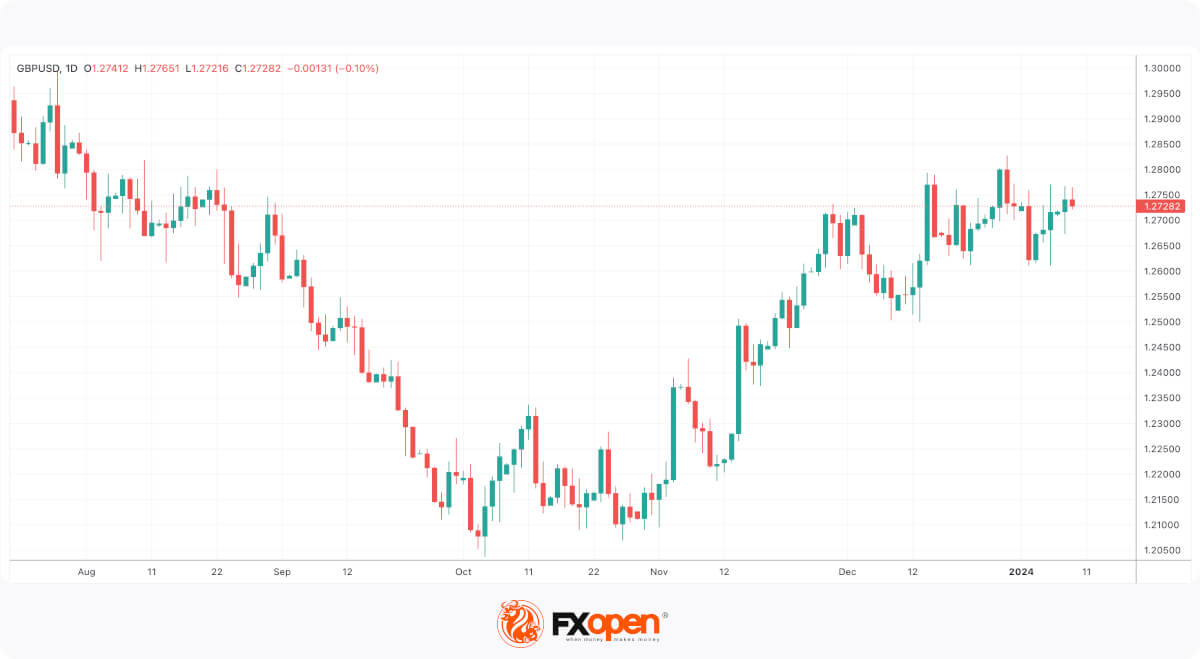
Despite the absence of major fiscal catastrophes that plagued the United States last year, the British economy has been met with caution from both corporate giants and investors.

Unlike the series of bank collapses and near-insolvent government coffers experienced in the US, Britain has remained relatively stable. However, concerns persist among investors, and the pound faces a dip against the US dollar.
In contrast to the economic challenges faced by the United States, where fiscal disasters led to the demise of established banks and the need to raise the debt ceiling, the British economy has navigated the past year without such high-profile crises. The strength of the US dollar against other majors, despite these challenges, may be attributed to a highly productive workforce and controlled inflation, factors that outpaced developments in Europe and the United Kingdom.
A potential boost for the British economy comes from a recent report by PriceWaterhouseCoopers, suggesting that Britain may emerge as a global hub for manufacturing. This revelation contradicts the conventional view of high-cost bases in Western countries as unattractive for goods manufacturers, given factors such as high salaries, energy costs, worker shortages, taxation, logistical issues, and the post-Brexit bureaucratic challenges.
PriceWaterhouseCoopers conducted a survey of over 200 senior manufacturing executives. The majority of respondents believed that Britain had become a more competitive location for industrial production compared to the previous 12 months.
While some manufacturing in the United Kingdom has thrived for years, with companies like BAE Systems, Jaguar Land Rover, Nissan Motor Company, GSK, and Rolls Royce gaining global recognition for their quality of science and engineering, the overall perception is changing. The report indicates that Britain has improved its competitiveness in manufacturing compared to neighbouring France and Germany, although it still lags behind China and the United States.
Despite the positive outlook from UK CEOs regarding manufacturing in 2024, the British pound faces a decline against the US dollar.T he British pound has depreciated in value against the US dollar, with FXOpen registering a decline from 1.2741 yesterday to 1.2728 at the time of writing.
Britain’s manufacturing output has been on a declining trend for about a year and a half. Whether a reduction in the cost of borrowing by the Bank of England in the coming Spring will revive manufacturing remains uncertain. The challenge is compounded by the US Federal Reserve contemplating rate reductions, eliminating any significant advantage for the UK over the US.
As the dynamics unfold, the health of the national economy will be closely monitored, with manufacturing output serving as a key indicator. The mixed signals in the market emphasise the complex interplay of factors influencing the economic landscape.
FXOpen offers spreads from 0.0 pips and commissions from $1.50 per lot. Enjoy trading on MT4, MT5, TickTrader or TradingView trading platforms!
This article represents the opinion of the Companies operating under the FXOpen brand only. It is not to be construed as an offer, solicitation, or recommendation with respect to products and services provided by the Companies operating under the FXOpen brand, nor is it to be considered financial advice.
Disclaimer:The subject matter and the content of this article are solely the views of the author. FinanceFeeds does not bear any legal responsibility for the content of this article and they do not reflect the viewpoint of FinanceFeeds or its editorial staff.







